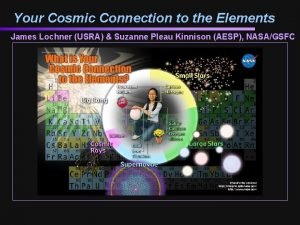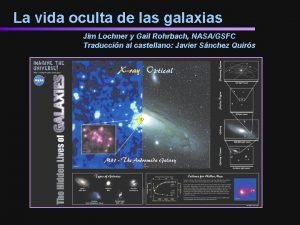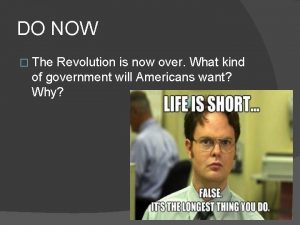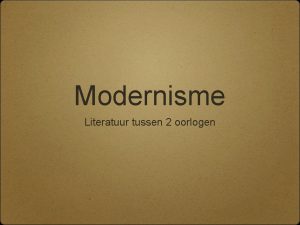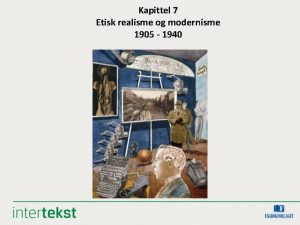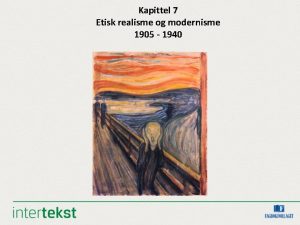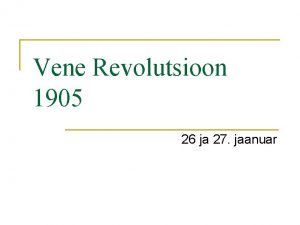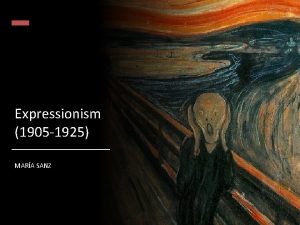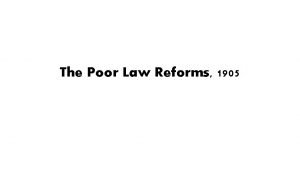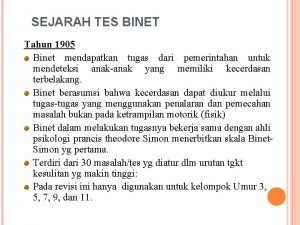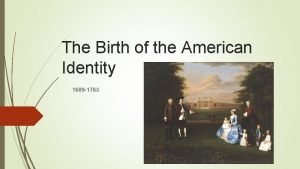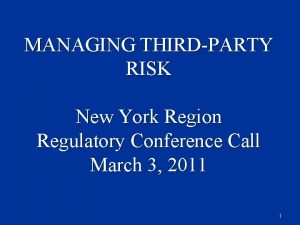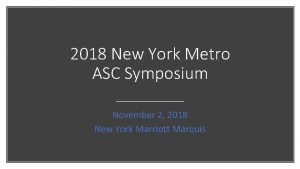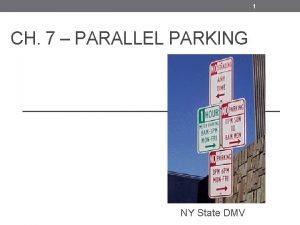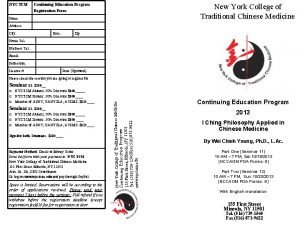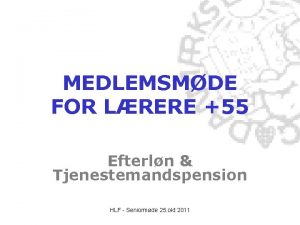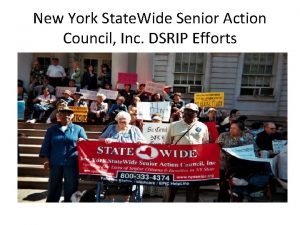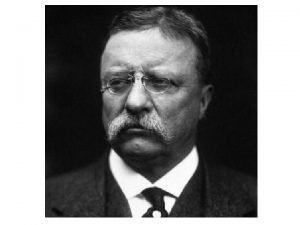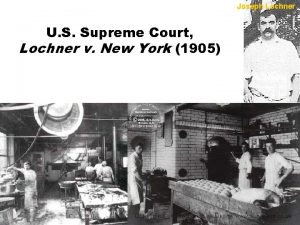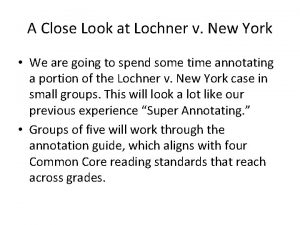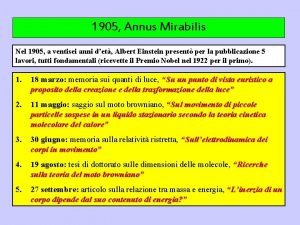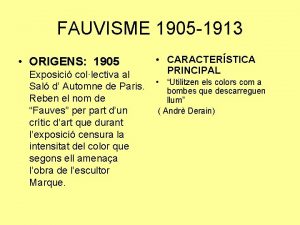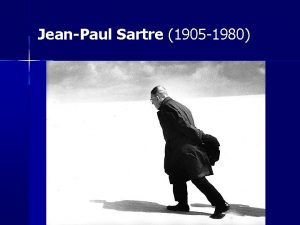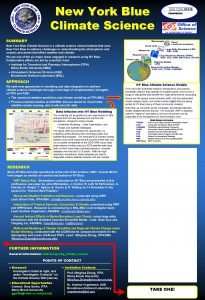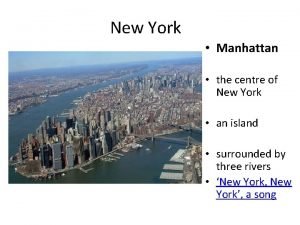Lochner v New York 1905 Is this a




































- Slides: 36


Lochner v. New York (1905) Is this a fair, reasonable and appropriate exercise of the police power of the State, or is it an unreasonable, unnecessary and arbitrary interference with the right of the individual to his personal liberty or to enter into those contracts in relation to labor which may seem to him appropriate or necessary for the support of himself and his family? Of course, the liberty of contract relating to labor includes both parties to it. The one has as much right to purchase as the other to sell labor. Holmes dissent I think that the word liberty in the Fourteenth Amendment is perverted when it is held to prevent the natural outcome of a dominant opinion, unless it can be said that a rational and fair man necessarily would admit that the statute proposed would infringe fundamental principles as they have been understood by the traditions of our people and our law. It does not need research to show that no such sweeping condemnation can be passed upon the statute before us.



Muller v. Oregon (1908) The two sexes differ in structure of body, in the functions to be performed by each, in the amount of physical strength, in the capacity for long-continued labor, particularly when done standing, the influence of vigorous health upon the future wellbeing of the race, the self-reliance which enables one to assert full rights, and in the capacity to maintain the struggle for subsistence. This difference justifies a difference in legislation, and upholds that which is designed to compensate for some of the burdens which rest upon her.




CALIFORNIA CONSTITUTION ARTICLE 2 VOTING, INITIATIVE AND REFERENDUM, AND RECALL SECTION 1. All political power is inherent in the people. Government is instituted for their protection, security, and benefit, and they have the right to alter or reform it when the public good may require. SEC. 8. (a) The initiative is the power of the electors to propose statutes and amendments to the Constitution and to adopt or reject them. SEC. 9. (a) The referendum is the power of the electors to approve or reject statutes or parts of statutes except urgency statutes, statutes calling elections, and statutes providing for tax levies or appropriations for usual current expenses of the State. SEC. 13. Recall is the power of the electors to remove an elective officer.



My opponents charge that two things in my programme are wrong because they intrude into the sanctuary of the judiciary. The first is the recall of judges; and the second, the review by the people of, judicial decisions on certain constitutional questions. . . I say it soberly democracy has a right to approach the sanctuary of the courts when a special interest has corruptly found sanctuary there; and this is exactly what has happened in some of the States where the recall of the judges is a living issue. I would far more willingly trust the whole people to judge such a case than some special tribunal—perhaps appointed by the same power that chose the judge if that tribunal is not itself really responsible to the people and is hampered and clogged by the technicalities of impeachment proceedings. I am proposing merely that in a certain class of cases involving police power, when a State court has set aside as unconstitutional a law passed by the legislature for the general welfare, the question of the validity of the law, which should depend, as Justice Holmes so well phrases it, upon the prevailing morality or preponderant opinion be submitted for final determination to a vote of the people, taken after due time for consideration.



Pollock v. Farmers’ Loan & Trust Co. (White dissent) I cannot resist the conviction that its opinion and decree in this case virtually annuls its previous decisions in regard to the powers of Congress on the subject of taxation, and is therefore fraught with danger to the court, to each and every citizen, and to the republic. The conservation and orderly development of our institutions rests on our acceptance of the results of the past and their use as lights to guide our steps in the future. Teach the lesson that settled principles may be overthrown at any time, and confusion and turmoil must ultimately result. In the discharge of its function of interpreting the Constitution, this court exercises an august power. It sits removed from the contentions of political parties and the animosities of factions. It seems to me that the accomplishment of its lofty mission can only be secured by the stability of its teachings and the sanctity which surrounds them. If the permanency of its conclusions is to depend upon the personal opinions of those who, from time to time, may make up its membership, it will inevitably become a theatre of political strife, and its action will be without coherence or consistency.

1913 Income tax rates 16 th amendment: The Congress shall have power to lay and collect taxes on incomes, from whatever source derived, without apportionment among the several states, and without regard to any census or enumeration.




Northern Securities Co. v. United States (1904, Harlan) No State can, by merely creating a corporation, or in any other mode, project its authority into other States, and across the continent, so as to prevent Congress from exerting the power it possesses under the Constitution over interstate and international commerce, or so as to exempt its corporation engaged in interstate commerce from obedience to any rule lawfully established by Congress for such commerce… Many suggestions were made in argument based upon the thought that the Anti-Trust Act would, in the end, prove to be mischievous in its consequences. Disaster to business and wide-spread financial ruin, it has been intimated, will follow the execution of its provisions. Such predictions were made in all the cases heretofore arising under that act. But they have not been verified. It is the history of monopolies in this country and in England that predictions of ruin are habitually made by them when it is attempted, by legislation, to restrain their operations and to protect the public against their exactions.

Standard Oil v. U. S. (1911) It may be with accuracy said that the dread of enhancement of prices and of other wrongs which it was thought would flow from the undue limitation on competitive conditions caused by contracts or other acts of individuals or corporations led, as a matter of public policy, to the prohibition or treating as illegal all contracts or acts which were unreasonably restrictive of competitive conditions, either from the nature or character of the contract or where the surrounding circumstances were such as to justify the conclusion that they had not been entered into or performed with the legitimate purpose of reasonably forwarding personal interest and developing trade, but, on the contrary, were of such a character as to give rise to the inference or presumption that they had been entered into or done with the intent to do wrong to the general public and to limit the right of individuals, thus restraining the free flow of commerce and tending to bring about the evils, such as enhancement of prices, which were considered to be against public policy.




Comstock Act (1873) Be it enacted. . . That whoever, within the District of Columbia or any of the Territories of the United States. . . shall sell. . . or shall offer to sell, or to lend, or to give away, or in any manner to exhibit, or shall otherwise publish or offer to publish in any manner, or shall have in his possession, for any such purpose or purposes, an obscene book, pamphlet, paper, writing, advertisement, circular, print, picture, drawing or other representation, figure, or image on or of paper or other material, or any cast instrument, or other article of an immoral nature, or any drug or medicine, or any article whatever, for the prevention of conception, or for causing unlawful abortion, or shall advertise the same for sale, or shall write or print, or cause to be written or printed, any card, circular, book, pamphlet, advertisement, or notice of any kind, stating when, where, how, or of whom, or by what means, any of the articles in this section…can be purchased or obtained, or shall manufacture, draw, or print, or in any wise make any of such articles, shall be deemed guilty of a misdemeanor, and on conviction thereof in any court of the United States. . . he shall be imprisoned at hard labor in the penitentiary for not less than six months nor more than five years for each offense, or fined not less than one hundred dollars nor more than two thousand dollars, with costs of court.


Patterson v. Colorado (1907) A publication likely to reach the eyes of a jury, declaring a witness in a pending cause a perjurer, would be none the less a contempt that it was true. It would tend to obstruct the administration of justice, because even a correct conclusion is not to be reached or helped in that way, if our system of trials is to be maintained. The theory of our system is that the conclusions to be reached in a case will be induced only by evidence and argument in open court, and not by any outside influence, whether of private talk or public print.


Fox v. Washington (1915) It does not appear and is not likely that the statute will be construed to prevent publications merely because they tend to produce unfavorable opinions of a particular statute or of law in general. In this present case the disrespect for law that was encouraged was disregard of it, -an overt breach and technically criminal act. It would be in accord with the usages of English to interpret disrespect as manifested disrespect, as active disregard going beyond the line drawn by the law. That is all that has happened as yet, and we see no reason to believe that the statute will be stretched beyond that point.


Webb-Kenyon Act (1913) The shipment or transportation, in any manner or by any means whatsoever of any spirituous, vinous, malted, fermented, or other intoxicating liquor of any kind from one State, Territory, or District of the United States, or place noncontiguous to, but subject to the jurisdiction thereof, into any other State, Territory, or District of the United States, or place noncontiguous to, but subject to the jurisdiction thereof, which said spirituous, vinous, malted, fermented, or other intoxicating liquor is intended by any person interested therein, to be received, possessed, sold, or in any manner used, either in the original package, or otherwise, in violation of any law of such State, Territory, or District of the United States, or place noncontiguous to, but subject to the jurisdiction thereof, is hereby prohibited.





 James lochner
James lochner Jim lochner
Jim lochner Leanne keene french ambassador arrives from paris
Leanne keene french ambassador arrives from paris New york pennsylvania new jersey delaware
New york pennsylvania new jersey delaware Marquee cinemas - orchard 10
Marquee cinemas - orchard 10 Strengths and weaknesses of the articles of confederation
Strengths and weaknesses of the articles of confederation Modernisme in de literatuur
Modernisme in de literatuur 1905-1828
1905-1828 Poor law commission 1905
Poor law commission 1905 1905 time
1905 time 1907 generasjonen
1907 generasjonen Kamplyrikk
Kamplyrikk Vene revolutsioon 1905
Vene revolutsioon 1905 Pintor frances
Pintor frances Mesaj expresionist apelativ
Mesaj expresionist apelativ Ospyciu
Ospyciu Derain collioure 1905
Derain collioure 1905 The poor law commission of 1905
The poor law commission of 1905 Russian revolution of 1905 definition ap world history
Russian revolution of 1905 definition ap world history Russian revolution of 1905 definition ap world history
Russian revolution of 1905 definition ap world history Tes binet untuk usia berapa
Tes binet untuk usia berapa New york station
New york station Isle island new york
Isle island new york The new york weekly journal
The new york weekly journal New york scale heart failure
New york scale heart failure The new york weekly journal
The new york weekly journal Stephen king biography
Stephen king biography Lega amerike
Lega amerike Lachlan molony
Lachlan molony Third party risk management conference 2019 new york
Third party risk management conference 2019 new york Taoki new york
Taoki new york Ny metro asc symposium new york
Ny metro asc symposium new york Nystatedmv
Nystatedmv New york college of traditional chinese medicine mineola
New york college of traditional chinese medicine mineola Lrere
Lrere New york statewide senior action council
New york statewide senior action council How many roundabouts in new york
How many roundabouts in new york
